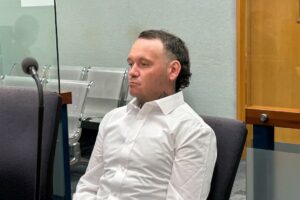
Australia’s antisemitism envoy Jillian Segal yesterday released her “plan to combat antisemitism“, which she thinks is “evident within schools and universities and has become ingrained and normalised within academia and the cultural space”.
Segal’s report is a fully fledged crackdown. In just a few short paragraphs, the report sets out a blueprint for the most sweeping intervention in Australian universities since Federation. If implemented, the result would be wholesale surveillance and censorship of higher education, teaching and research, enforced by the threat of defunding of entire institutions.
The report outlines a plan for Australia’s universities to follow through on adopting the controversial International Holocaust Remembrance Alliance (IHRA) definition of antisemitism, one that its own drafter has warned is being weaponised against Jewish students. Segal’s plan argues that “all members of the university community — including staff, students and visitors — who promote antisemitic rhetoric or harassment of Jewish students or academics must be held accountable.”
Related Article Block Placeholder
Article ID: 1213815
Segal says she is going to issue a “report card” on how well universities do these tasks at the start of 2026. If the universities don’t pull their socks up, she wants a dedicated judicial inquiry that would look at “systemic issues” as well as “foreign sources of funding for antisemitic activities and academics”.
If this wasn’t bold enough, she also says that a “key action” should include working with the government “to enable government funding to be withheld, where possible, from universities, programs or individuals within universities”. This includes liaising with grant authorities to “establish that all public grants provided to university centres, academics or researchers can be subject to termination”.
Australia’s antisemitism envoy doesn’t explain in any detail how this sweeping “university reform” will be achieved. But the scale of the intervention would require extensive amendments to federal legislation and the rewriting of 47 separate Commonwealth funding agreements with the individual universities.
Australia’s public universities are governed by an overlapping set of laws and regulations at both state and federal level. Most universities are established under their own acts from state and territory parliaments. Meanwhile, the federal government plays the key role in funding and setting overarching policy frameworks.
Those state and territory acts of parliament make universities highly independent entities; they are not ASIC corporations or plain vanilla non-government organisations. They typically have their own board of governors, called councils, and they don’t report to a minister in the same way that a line department or government agency does. Leaving aside the Australian National University, which has a federal act, it’s not clear that the Commonwealth has the legislative powers to intervene directly in university governance.
The Higher Education Support Act governs the distribution of Commonwealth funds to public universities. The institutions are given so-called “block grants” based on their student enrolments. The money can be used in reasonably unconstrained ways to pay for teaching and to cross-subsidise vital research.
On my reading of the legislation, the education minister does not currently have the power to cancel university funding for political reasons. In Labor’s first term, Education Minister Jason Clare tried and failed to rewrite the legislation to individually control the number of international students each university could enrol. Clare’s legislation was blocked by the Greens and the Coalition in the Senate.
Related Article Block Placeholder
Article ID: 1213865
Segal’s plan is far larger and more consequential than that bill.
One thing the Higher Education Support Act does specify is that “a higher education provider … must have a policy that upholds freedom of speech and academic freedom”. This provision was inserted into the act by the Morrison government because the Coalition back then was very concerned about freedom of speech on campus. There is a clear conflict between regulating antisemitism on campus and the legislated requirements of universities to protect freedom of speech.
Presumably, Segal would seek to amend this requirement. But she doesn’t say that in her report.
Perhaps detail is not the point in a report with vaulting ambitions to monitor the media, vet visa applicants, censor arts organisations and regulate artificial intelligence, but it does seem strange that Segal has not given any serious thought to exactly how the Albanese government might plausibly carry out such a deep and invasive intervention.
Nor has any thought been given to what would actually happen if, for instance, the education minister were to withhold a year’s worth of funding to a public university. In many cases, the answer is immediate insolvency.
For mid-tier universities like Griffith, Newcastle or La Trobe, Commonwealth funding accounts for around three-fifths of their annual budget. No institution could easily survive the subtraction of so much income. While universities have some cash reserves and a lot of valuable land they could eventually sell, the withholding of even a portion of their public funding would quickly push most to the edge.
Closing down a university to combat antisemitism would not be a great result for its students — including its Jewish students. The economic impact would also be significant. In cities like Newcastle, Wollongong and Ballarat, universities are some of the largest employers.
Related Article Block Placeholder
Article ID: 1213438
Obviously, such an existential threat would make university vice-chancellors and boards pay the closest attention to the “report card” that Segal wants to produce in coming months — and this, surely, is the point. But even the distant threat of such draconian intervention will be deeply destabilising for a sector already shedding jobs.
Among the most amusing aspects of this farrago of wishful thinking is the touching faith Segal reserves for the Tertiary Education Quality and Standards Agency (TEQSA), the sector’s largely ineffectual regulator. TEQSA has done little to stop systemic wage theft from university teachers, arrest dramatic slides in teaching quality or address an epidemic of sexual assault on campuses. Yet somehow Segal believes the agency can “ensure that systemic action is taken to reverse a dangerous trajectory of normalised antisemitism in many university courses and campuses”.
This is the sort of thing someone might write if they knew very little about the way Australian higher education is actually regulated.
It’s hard to escape the authoritarian implications of this extraordinary proposal. The similarities to the actions of the Trump administration in the US are all too clear. In America, Donald Trump’s government has used vague and unsubstantiated allegations of antisemitism to withhold billions of dollars of funding from institutions like Harvard and Columbia. The impacts on US higher education have been profound.
Are you worried about how Segal’s plan might impact universities?
We want to hear from you. Write to us at letters@crikey.com.au to be published in Crikey. Please include your full name. We reserve the right to edit for length and clarity.





